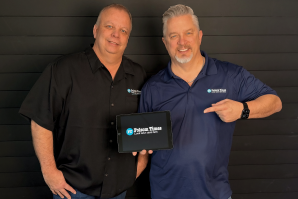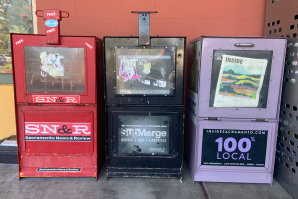“Harry Potter” is the best-selling book series of all time, so it shouldn’t be surprising that fan fiction is abundant. Some amateur writers create their own stories with new characters, settings or abilities for the young wizard to encounter. These tales are made for fun, not profit. It can’t be sold legally. Story elements like “Hogwarts” and “Quidditch” are trademarked. Plus, due to copyright, J. K. Rowling’s original text can’t be reused verbatim unless under certain circumstances.
But what if, for a fee, someone offered to splice some fan fiction into your copy of “Goblet of Fire”? Or sold fan fiction in bound books? Then you’d have something similar to the video game modding market. There is money to be made in altering consoles and games. It is illegal but typically unenforced. Stores are too afraid of getting a cease-and-desist letter threatening lawsuits from a multi-national tech company, but some individuals are willing to take that chance. The names of mod sellers interviewed for this article have been changed to protect them from legal action.
Any software developer who wants their game to play on consoles like Sony’s PlayStation 5 or Microsoft’s Xbox Series X has to get that company’s approval. But there is an alternative. Hobbyists called Homebrewers create free-to-use software to share online. Some Homebrew programs can run on a console, but getting them to work isn’t simple. It requires special tools and knowledge. So people like Adam, of Sacramento, offer a console modding service to customers through websites like Craigslist, eBay, Etsy or Facebook Marketplace.
Tinkering with consequences
Adam has no formal training in computers. He learned the trade by tinkering with electronics for fun. There are how-to guides and video tutorials online showing what to do. With their help, he built an arcade cabinet and repaired the disk drive of his Nintendo Wii. “It wasn’t easy, but it wasn’t hard,” he says. Adam turned his hobby into a side business to justify buying tools and equipment. Over the past decade, he fixed Xbox 360s and KitchenAid stand mixers.
That changed after a cheap circuit board called a Raspberry Pi Pico hit the market a few years ago. With it, Adam can install Homebrew software onto the Nintendo Switch. This requires a capable microscope and a temperature-controlled soldering iron to attach the chip to the internal hardware. It’s a process that takes time to learn and risks damaging the $300 console. That’s why people pay Adam to do the job. Is this legal?
“As any good lawyer would tell you, it depends,” says Mitch Stoltz, an attorney with the Electronic Frontier Foundation, a nonprofit based in San Francisco advocating for consumer legal rights for three decades. The general understanding is that a person in the U.S. can modify any product they own. However, Section 1201 of the Digital Millennium Copyright Act, which Stoltz calls “a poorly written law from 1998,” makes it a federal crime to sell a device that circumvents software locking access to a copyrighted work. This includes the board Adam installs, which is colloquially called a modchip. Stoltz says this article in the DMCA was mainly intended to fight DVD piracy, but companies use it to control what people do with their products.
A Xbox disassembled by a mod seller. (Darkone Customs)

Selling modchips could be considered “trafficking in a circumvention technology,” even if it’s not directly connected to piracy. A company in court doesn’t have to prove that the mod seller intended their product to distribute or play illegal copies of games, only that it could. “That’s why this is a terrible law,” Stoltz says. However, there is still uncertainty even after all these years. Criminal prosecutions are rare. A mod seller could be liable in civil court for “easily into the six figures.” It’s infrequent but not impossible. Adam said he has modded about 300 consoles within the last year and will continue until threatened with legal action. The legal uncertainty does make some of his customers nervous.
“Doing this type of stuff, because there is that kind of gray area,” Adam says, “people feel, it’s not like a drug deal, but I take them to a space where you’re feeling a little bit uneasy about the process.”
Some mod sellers can be sketchy. Adam has heard of clients getting ghosted by modders after a job is done, which can be a problem if something goes wrong. That’s why he explains the procedure to customers, answers any questions and promises to replace parts broken on his watch. People can drop off their console at Adam’s house and see his garage workshop, which also helps to build trust. “I’m not meeting them at a Starbucks somewhere, exchanging briefcases under the table,” Adam says. “So a lot of people are a little more at ease.”
Keeping classics alive
More than 150 million Nintendo Switches have been sold worldwide, making it a prime target for modders. There’s also demand for modifications to older consoles, some 40 years old. That’s a specialty of Thomas, of Modesto. Some electronic parts will break over time. Customers can mail their consoles to Thomas’ home business Darkone Customs, and he’ll make repairs. He’s worked on anything as old as the NES to as new as the PlayStation 4, even obscure consoles from Japan. “You name it, I’ve touched it,” he says.
He can install enhancements, too, like adding a rechargeable USB-C battery to a Nintendo Game Boy or a better screen to a Sega Game Gear. That’s clearly legal, but what’s more murky are the modchips he creates for the original Xbox that customers install themselves.
Like Adam, Thomas draws the line at piracy. His modchips can’t be used for piracy unless hacked. He said the sellers who download illegal games for clients onto a console are “trying to make a quick buck” and are in it solely for the money over a love of the craft. It’s this association with piracy that turns off a lot of folks to modchips. There are applications other than stealing. A modchip could be used to install software that makes region-locked games sold outside North America playable, or translate dialogue and text in a game into another language.
“There’s such a negative stigma with modifying your hardware,” Thomas says. “People aren’t looking at preservation efforts, or keeping their system up and going, or the repair aspects of it. People are just focused on that net negative, and they don’t want to be associated with that.”
Retro tech, remixed
Other moders can completely change how the console functions. They could install a new operating system like Linux or turn them into musical instruments. Jacob, of Sacramento, under the name Hobby Chop, sells game cartridges that play music on the Game Boy. He also sells a device that plugs into the handhold console, turning it into an electronic music synthesizer called an Arduinoboy. Jacob’s customers are typically music producers who want to incorporate that retro chiptune sound into recorded tracks or live performances. Making these products helps Jacob pay the bills. “In this economy, you need a side job almost to survive,” he says.
A Nintendo GameCube disassembled by a mod seller. (Darkone
Customs)

“Pretty much any game you can think of for the Game Boy, it’s probably for sale on Etsy somewhere, which concerns me,” Jacob says, adding “I just don’t want people to have that attention on Etsy because then maybe I get caught in the crossfire because they misinterpret something that I’m doing.”
ROM (Read-only Memory) Hacks are another software mod that Homebrewers will put onto retro game cartridges. These are commercially released games that people alter to add new features. Basically, fan fiction for video games. Hobbyists will add new outfits, weapons or even entire levels. Lots of game companies embrace them as a way to add value to their products. “There are a lot of things that are tolerated and not enforced, even though technically they could be,” Stoltz, the lawyer, says. “And I think modded games fall into that category.”
Gaming the legal gray zone
Dylan, of Roseville, makes a living selling consoles, games, toys and 3D printed goods under the name Retro Zoomin. He also sells reproduction game cartridges, called repros, containing ROM Hacks and Fan Games, which are original games using trademarked characters. He downloads the software from the internet and then hires a manufacturer to create the repros with labels Dylan designed.
Quality labels are key. Some collectors buy these games as novelties for a display shelf. Others use them as a more affordable way to play a popular old game on retro hardware. Either way, Dylan doesn’t want to trick customers or cross the line into bootlegs, although the minimally changed games come close. He has had to say, “It’s not real,” to confused-looking customers who visit his vendor booth at events and don’t know what they’re looking at. These games are copyright and trademark violations, but Dylan thinks he’s too small a seller to ever get into legal trouble from a big company like Nintendo.
“If I get a cease-and-desist from Nintendo, I’m going to frame that,” Dylan says. “That is the coolest thing I’ve ever seen. Maybe I’m just a bit of a Nintendo nerd, so I’m just like, Nintendo knows I exist. Look at them caring!”
The threat of a lawsuit would only cause Dylan to move to a different online marketplace or sell his repros only in person at conventions. Long term, he’d like to create and sell original games. He even designed his own mascot, a rollerskating desert rodent called a jerboa. “I think that’s the goal for everybody who does this, I’d hope, to go official.”
–
Subscribe to the Comstock’s newsletter today.
Recommended For You

Local News Is Breaking. Can These Websites Fix It?
These local news sites are responding to the decline in legacy print newspapers
Many digital news outlets like the Folsom Times have popped up in the Capital Region over the past two decades. Are they destined to cease like the newspapers that came before them, or is it possible to build a local newsroom financially sustainable enough to last?

The Man Who Buys the Capital Region’s Dying Newspapers
Paul Scholl has accumulated 18 print newspapers in under two decades
Paul Scholl started a newspaper about two decades ago to promote his services as a hospice chaplain. Now he brings relief to papers on their deathbeds. How did Scholl come to not only own 18 papers but to make them financially sustainable?

Page Not Found: Sacramento’s Disappearing Digital News
While libraries, museums and government archives preserve print copies of newspapers and magazines, news websites can disappear when the business closes
Digital permanence is a myth. Last year more than two newspapers closed a week on average in the United States, according to a report from the Medill School of Journalism at Northwestern University. When web hosting bills go unpaid, what happens to online content?

Should Businesses Crowdfund?
Kickstarter and Indiegogo campaigns have financed a number of Capital Region businesses and creators, but it’s easier said than done
Ever thought about launching a Kickstarter campaign? Here’s what local businesses have to say about crowdfunding.



